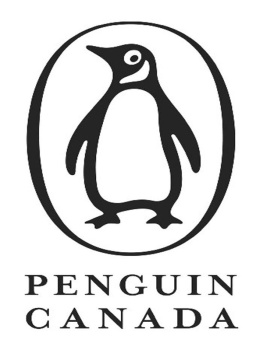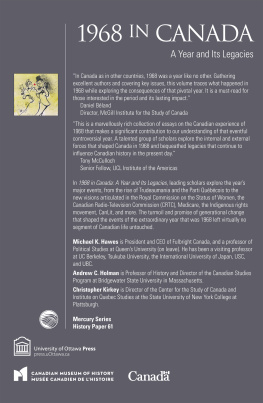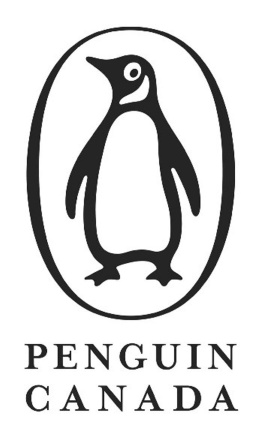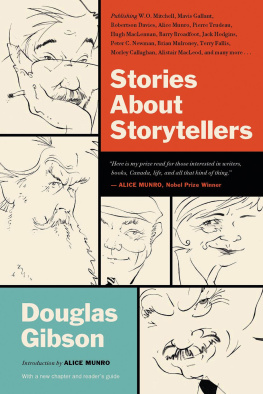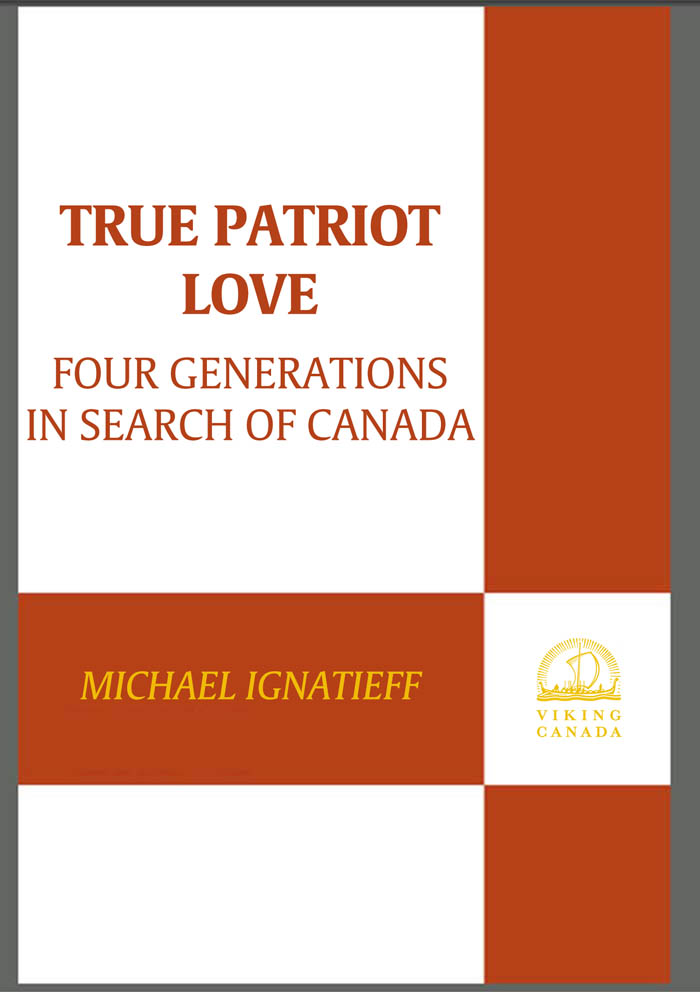TRUE
PATRIOT
LOVE
ALSO BY MICHAEL IGNATIEFF
Non-Fiction
A Just Measure of Pain: The Penitentiary in the Industrial
Revolution, 17801850
Wealth and Virtue: The Shaping of Political Economy in the
Scottish Enlightenment (co-edited with Istvan Hont)
The Needs of Strangers
Blood and Belonging: Journeys into the New Nationalism
The Russian Album
The Warriors Honour: Ethnic War and the Modern
Conscience
Isaiah Berlin: A Life
The Rights Revolution
Human Rights as Politics and Idolatry
Empire Lite: Nation-Building in Bosnia, Kosovo and
Afghanistan
The Lesser Evil: Political Ethics in an Age of Terror
American Exceptionalism and Human Rights
Fiction
Asya
Scar Tissue
Charlie Johnson in the Flames
MICHAEL
IGNATIEFF

TRUE
PATRIOT
LOVE
FOUR GENERATIONS IN
SEARCH OF CANADA

VIKING CANADA
Published by the Penguin Group
Penguin Group (Canada), 90 Eglinton Avenue East, Suite 700, Toronto, Ontario, Canada M4P 2Y3 (a division of Pearson Canada Inc.)
Penguin Group (USA) Inc., 375 Hudson Street, New York, New York 10014, U.S.A.
Penguin Books Ltd, 80 Strand, London WC2R 0RL, England
Penguin Ireland, 25 St Stephens Green, Dublin 2, Ireland (a division of Penguin Books Ltd)
Penguin Group (Australia), 250 Camberwell Road, Camberwell, Victoria 3124, Australia (a division of Pearson Australia Group Pty Ltd)
Penguin Books India Pvt Ltd, 11 Community Centre, Panchsheel Park, New Delhi 110 017, India
Penguin Group (NZ), 67 Apollo Drive, Rosedale, North Shore 0745, Auckland, New Zealand (a division of Pearson New Zealand Ltd)
Penguin Books (South Africa) (Pty) Ltd, 24 Sturdee Avenue, Rosebank, Johannesburg 2196, South Africa
Penguin Books Ltd, Registered Offices: 80 Strand, London WC2R 0RL, England
First published 2009
1 2 3 4 5 6 7 8 9 10 (RRD)
Copyright Michael Ignatieff, 2009
Author representation: Westwood Creative Artists
94 Harbord Street, Toronto, Ontario M5S 1G6
All rights reserved.
The photos on pages 1, 31, and 71 are from the Ignatieff familys personal collection.
The photo of George Parkin Grant on page 117 was taken by William Christian.
The photo of Michael Ignatieff on page 155 was taken by Michael Stuparyk/Toronto Star.
All rights reserved. Without limiting the rights under copyright reserved above, no part of this publication may be reproduced, stored in or introduced into a retrieval system, or transmitted in any form or by any means (electronic, mechanical, photocopying, recording or otherwise), without the prior written permission of both the copyright owner and the above publisher of this book.
Manufactured in the U.S.A.
ISBN: 978-0-670-06972-9
Library and Archives Canada Cataloguing in Publication data available upon request to the publisher.
Visit the Penguin Group (Canada) website at www.penguin.ca
Special and corporate bulk purchase rates available; please see www.penguin.ca/corporatesales or call 1-800-810-3104, ext. 477 or 474
For my wife, Zsuzsanna, as always
C ONTENTS
A UTHORS N OTE
I n 2000, when I began working on this book, I was a private citizen. When I finished it in 2009, I had become a politician. The intentions I had at the beginningto tell the story of my mothers people and their vision of Canadawere the intentions that carried me through to the end. It is a tribute to my mother, Alison Grant Ignatieff, and is offered to the granddaughter she never got the chance to know, Sophie Turia Ignatieff.
1
TRUE PATRIOT LOVE


True patriot love in all thy sons command.
With glowing hearts we see thee rise,
The True North strong and free!
(FROM O CANADA!, THE NATIONAL ANTHEM OF CANADA)
I
On the Love of Country
L oving a country is an act of the imagination. We start from what we knowthe street where we grew up, the brightly lit skating rinks at night, the tingle of the lake water when we first plunge in, the feeling when we set our feet back on native soiland we make these parts stand for the whole. What we know is only a fragment of what is there. We have to imagine the expanse we have not seen. We have to imagine the ties that bind us to our fellow citizens, many of whom may not even speak the same language. We reason out from the rituals we share, the rights we enjoy, the traditions we hold in commonand we imagine belonging to a place we can call home. Our political system, the leaders, the laws, the symbols and anthems matter to us because, when they work as they should, they give us the feeling that we share a life in common with the strangers we call fellow citizens.
We engage in this act of imagination because we need to. The lives we live alone do not make sense to us unless we share some public dimension with others. We need a public life in common, some set of reference points and allegiances to give us a way to relate to the strangers among whom we live. Without this feeling of belonging, even if only imagined, we would live in fear and dread of each other. When we can call the strangers citizens, we can feel at home with them and with ourselves. Isaiah Berlin described this sense of belonging well. He said that to feel at home is to feel that people understand not only what you say, but also what you mean. You love the country because it gives you the possibility of feeling at home. You cannot feel this alone. Your emotions must be shared with others in order for them to make any sense at all. A solitary patriot is a contradiction in terms. Love of country is an emotion shared in the imagination across time, shared with the dead, the living and the yet to be born.
Love of country, being imagined, is not a natural feeling like hunger. Human beings invented the complex emotions we feel for nations only in the eighteenth century. What we imagine we can forget. What we dream we can lose. Countries, being human creations, can experience both birth and death.
A country begins to die when people think life is elsewhere and begin to leave. It begins to die when order disintegrates, when people cease to trust their fellow citizens or their government. In a country that is truly alive, the laws hold us in obedience, not just through fear of punishment but also through attachment to the values and traditions the laws protect. If this attachment wanes, if obedience is reduced to fear, either chaos or tyranny beckons.
While love of country has to be shared, the feelings that are shared are not necessarily the same for every citizen. Patriotism is a contested emotion because countries are contested places. Citizens disagree with each other about what the country should stand for, what its traditions mean and what path it should take in the future. These disagreements are intrinsic to the life of any country that calls itself free. If such disagreements werent a necessary part of public life, we wouldnt need politics. But we do. Politics is how we manage public disagreement without resorting to violence. If our politics is good enough, we can keep our disagreements civil, but thats not to say free of anger. Some of the best patriots I have met have been the angriest. Their love of country expressed itself in fury at some acta wrongful war, a terrible decisionthat they believed betrayed the countrys best ideals.


